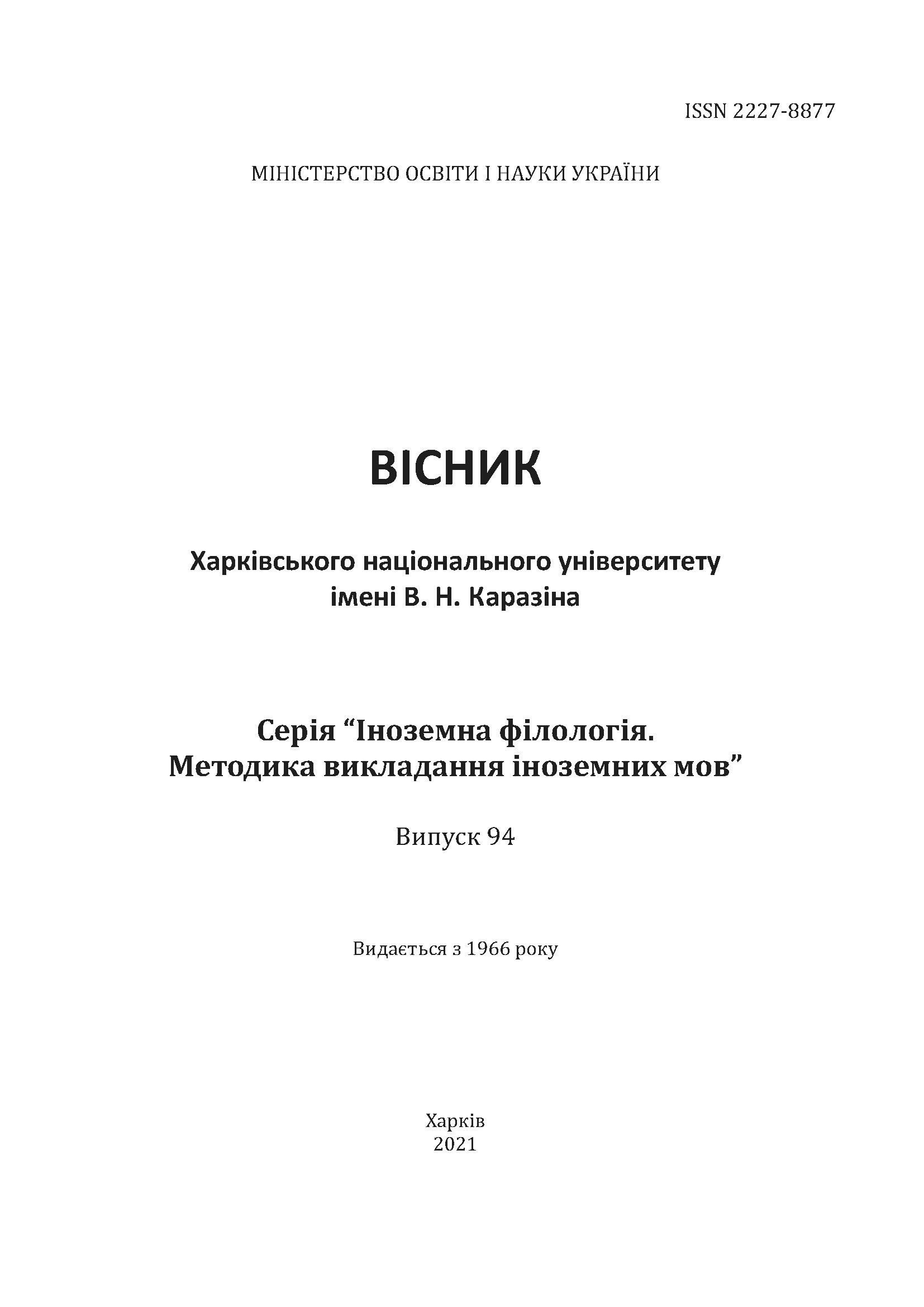Address of implicatures in dramatic discourse
Abstract
The article analyses utterances with implicatures in the character speech in German dramatic discourse based on the play “The Money is in the Bank” by German dramatist Curth Flatow, which presents the situational type of dramatic dialogue and imitation of colloquial speech. Address of implicatures is the direction of the speaker's perlocutionary goal to convey the implicature to the addressee, depending on the level of communication. The speaker's orientation to the addressee in intending implicatures correlates with two levels of communication in dramatic discourse outside of its stage implementation: horizontal (communication of characters) and vertical (communication between the author and the reader). Depending on the communicative attitude of the speaker and the level of communication, the address of implicatures demonstrates five types. The first two types relate to horizontal communication, the third to vertical, the fourth and fifth suggest double intending of the implicature at two levels. The first type of address is the most frequent: in his or her utterance, character 1 (the speaker) conveys the implicature to the addressee / group of addressees (character 2 / characters 1, 2, 3 ...). The second type of address concerns indirect verbal communication at the level of horizontal communication: in his or her utterance, character 1 (the speaker) conveys the implicature not to the direct addressee (character 2), but to the indirect (character 3). The third type of address involves only vertical communication: the author conveys the implicature to the reader in the utterance of character 1, directed at character 2; there may be several target characters. In the case of the fourth type of addressing, a double intending of implicature occurs: character 1 (the speaker) conveys the implicature to character 2 (addressee) in his or her utterance, and at the same time the author conveys the implicature to the reader in the same utterance. The fifth type of address is also a double intending of the implicature, but with the involvement of the indirect addressee: in his or her utterance, character 1 (the speaker) conveys the implicature not to the direct addressee (character 2), but to the indirect (character 3), and at the same time the author conveys the implicature to the reader in the same utterance.
Downloads
References
Arutjunova, N. D. (1999). Jazyk i mir cheloveka [Human language and world]. Moscow: Jazyki russkoj kul’tury Publ. (in Russian)
Bezugla, L. R. (2007). Verbalizaciya implicy`tny`x smy`sliv u nimecz`komovnomu dialogichnomu dy`skursi [Verbalization of implicit meanings in German dialogic discourse]. Kharkiv: V. N. Karazin Kharkiv National University Press. (in Ukrainian)
Bezugla, L. R. (2009). Dialog, dialogichny`j tekst ta dialogichny`j dy`skurs [Dialogue, dialogic text and dialogic discourse].
Visnyk Kharkiv. nats. un-tu im.V.N. Karazina [V.N. Karazin Kharkiv National Univ. Messenger], 867, 3–8. (in Russian)
Benvenist, E. (2002). Obshhaja lingvistika [General linguistics]. Moscow: Editorial URSS Publ. (in Russian)
Bogdanov, V. V. (2007). Predlozhenie i tekst v soderzhatel’nom aspekte [Sentence and text in a meaning aspect]. St. Petersburg: University Press, Faculty of Philology. (in Russian)
Bjuler, K. (2000). Teorija jazyka. Reprezentativnaja funkcija jazyka [Language theory. Representative function of language]. Moscow: Progress Publ. (in Russian)
Kljuev, Ye.V. (2002). Rechevaja kommunikacija: uspeshnost’ rechevogo vzaimodejstvija [Speech communication: the success of speech interaction]. Moscow: RIPOL KLASSIK Publ. (in Russian)
Kubrjakova, Ye. S. (2004). Jazyk i znanie: Na puti poluchenija znanij o jazyke. Chasti rechi s kognitivnoj tochki zrenija. Rol’ jazyka v poznanii mira [Language and knowledge: On the way of obtaining knowledge about the language. Parts of speech from a cognitive point of view. The role of language in the knowledge of the world]. Moscow: Jazyki slavjanskoj kul’tury. (in Russian)
Lagutin, V. I. (1991). Problemy analiza hudozhestvennogo dialoga [Problems of fiction dialogue analysis]. Kishinev: Shtiinca Publ. (in Russian)
Lukin, V. A. (2011). Hudozhestvennyj tekst: Osnovy lingvisticheskoj teorii. Analiticheskij minimum [Fiction text: Foundations of linguistic theory. Analytical minimum]. Moscow: Os’-89 Publ. (in Russian)
Mechkovskaja, N. B. (2009). Kak izmenilis’ antinomii «govorjashhij – slushajushhij» i «avtor – chitatel’» v vek interneta? [How have the antinomies “speaking – listening” and “author – reader” changed in the age of the Internet?]. Gorizonty sovremennoj lingvistiki: Tradicii i novatorstvo [The Horizons of Contemporary Linguistics: Tradition and Innovation], 207–221.
Pochepcov, G. G. (2009). Izbrannye trudy po lingvistike [Selected papers in linguistics]. Kharkiv: V. N. Karazin Kharkiv National University Press. (in Russian)
Jakobson, R. O. (1975). Lingvistika i pojetika [Linguistics and poetics]. Strukturalizm: «za» i «protiv» [Structuralism: Pros and cons], 193–230. (in Russian)
Grice, H. P. (1975). Logic and conversation. Syntax and semantics, 3, 41–58.
Hundsnurscher, F. (1994). Dialoganalyse und Literaturbetrachtung. In E. Weigand (Ed.), Concepts of Dialogue: Considered from the Perspective of Different Disciplines (pp. 77–105). Tübingen: Niemeyer.
ILLUSTRATORY REFERENCES
Flatow, C. (1995). Das Geld liegt auf der Bank und noch mehr Theater. München: Langen Müller.




